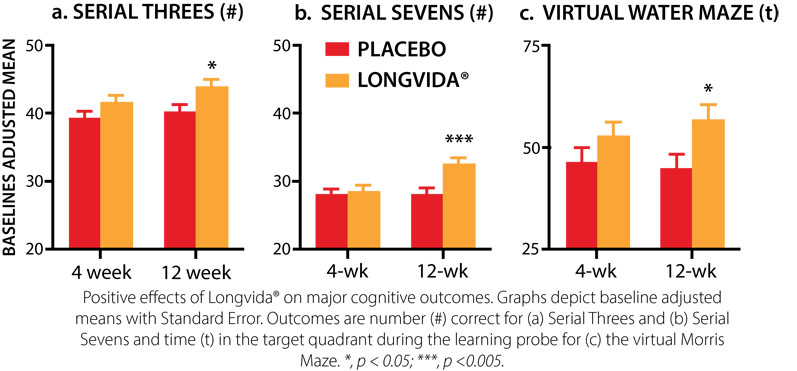Today, the same group of researchers have published a partial replication study, further establishing Longvida as the "Cognitive Curcumin of Choice" and supporting the positive results in cognition and mood first recognised in the groundbreaking study in 2014.
The new study, also conducted at Swinburne University, was a double-blind, placebo-controlled, parallel-groups "partial replication study evaluating similar effects [of improved working memory and reduced fatigue and stress reactivity in a healthy older cohort] at 4 and 12 weeks Longvida supplementation."
Eighty healthy men and women (aged 50-80 years) were randomised to receive 400 mg of Longvida daily (containing 80 mg of curcumin) or a matching placebo.
In the first study, acute (1 and 3 h) and chronic (28 day) mood and cognitive health effects of 400 mg of Longvida (compared with a placebo) showed significant acute improvements to two measures of working memory, with one remaining significantly better at 28 days.
Specifically, Longvida was associated with acutely improved working memory, sustained attention and spatial memory and learning] performance following 28-day intervention.
Additionally, there were a number of benefits to mood at 28 days. Researchers go on to explain: "In our previous study, our approach revealed significant improvements to mood and cognition in a 28-day intervention trial. Here, we sought to extend the findings of that earlier trial by including a 12-week assessment in addition to a 28-day testing session."
The primary objective of this new clinical trial was to evaluate whether the effects of the 4-week trial could be replicated following 12-weeks supplementation.
As with our previous study, curcumin [as Longvida 400mg/day] administration resulted in significant improvements to working memory and reductions in fatigue. These results support our hypothesis that the highly bioavailable curcumin preparation Longvida can improve mood and cognition in older, cognitively intact people.
It is further explained that, as in our previous study, [Longvida 400mg/day] administration led to reductions in fatigue at both 4 and 12-weeks. These reductions in "fatigue at both the 4 and 12-week time points and in the (single post treatment) 4-week assessment in our previous study suggests that it is a robust effect of Longvida curcumin in this population."

The promising results of this study show potential to support healthy aging with Longvida Optimized Curcumin. The range of significant results includes improvements in measures of mood and cognition such as, decreased fatigue, lowered tension and anxiety, improved working memory, sustained attention and improved spatial memory and learning.
In conclusion, these data further support previous findings that Longvida curcumin improves working memory and mood as well as the possibility of learning in healthy individuals. It is noteworthy that memory and fatigue are widely reported as the two more concerning non-physiological aspects of ageing.
This has potential promise to offset these effects and may also be relevant to conditions where mood and cognition are fragile.
"We are very excited this study has shown replicative results in a similar population of healthy older adults. Further confirming Longvida's benefits in mood and memory, it is very promising to see these results in subjects that have more education and slightly higher cognitive abilities prior to the study," said Leisha Jenkins, Marketing Associate at Verdure Sciences.
Jenkins went on to say: "Additionally, it is exceptionally promising to see very significant results (31% at 12 weeks) in spatial memory and learning. Spatial memory is known to occur in the hippocampus of the brain, and this is an area of particular interest for cognitive well-being. We are anxious to see the results from the next arm of the study with imaging of the hippocampus and how this all correlates to healthy brain ageing."
